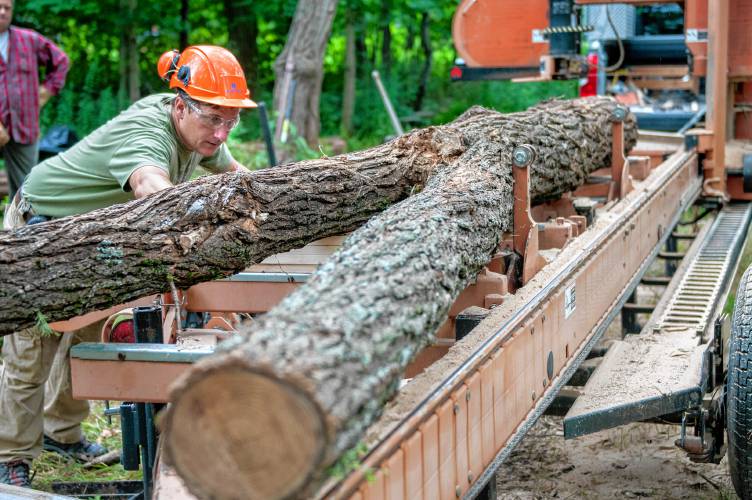Opinion: New Hampshire rural communities need trade stability

Timber framer Neil Godden of Goshen saws a log on a portable mill in 2017. File
| Published: 03-13-2025 1:32 PM |
Jameson S. French is the president and CEO of Northland Forest Products, Inc., a hardwood distributor with a yard in Kingston. Joe Carrier is the general manager of HHP, Inc., a hardwood sawmill located in Henniker. Jasen A. Stock is the executive director of the New Hampshire Timberland Owners Association.
Anyone following the ongoing trade and tariff debate could ask, “Why would a lumber company or timberland owners care about international trade or tariff issues?”
The answer is simple: The logs and lumber we grow and mill are sought after around the globe. New Hampshire is the second most forested state in the nation, and we are blessed with a diversity of tree and timber species sought after by the global economy. Logs and lumber flow freely across New Hampshire’s northern border with Canada, while international markets in Asia, Europe and the Middle East also purchase lumber and logs grown and milled in the Granite State.
But growing and processing logs into lumber takes time. The investments made by land and mill owners to grow, mill, dry and plane lumber take months and, in the case of growing timber, decades. Investments made today will not pay dividends for months and years from now. Unfortunately, the shifting and tumultuous trade environment in which we find ourselves is devaluing these investments and causing some unintended consequences.
This is especially true for hardwood lumber manufacturers. In anticipation of tariffs, these sawmills and distribution yards are feeling the sting of these trade disputes as international lumber customers are reluctant to purchase lumber to manufacture items for the U.S. market. Meanwhile, in the forest, not knowing if their market of choice will want to purchase logs or what the price will be, some loggers are reluctant to bid on hardwood timber stands. This reluctance ultimately hurts landowners who want to sell their timber and now have to wait to perform forest management on their land.
Since logs and lumber are processed domestically and exported internationally at the same time, the market tumult is disrupting this dynamic. Several hardwood manufacturers experienced this during the last trade war with China, when the Chinese government placed a retaliatory tariff on any U.S. manufactured lumber. This increased the cost of lumber for Chinese manufacturers, placing U.S. lumber at a competitive disadvantage compared to hardwood lumber from non-U.S. sources and U.S. hardwood logs.
The result was a triple hit to U.S. hardwood manufactures: Their lumber was worth less, they lost business to foreign hardwood lumber manufacturers and they lost the ability to compete for U.S.-grown hardwood sawlogs. U.S. sawmills suffered while Chinese while foreign sawmills benefitted.
Article continues after...
Yesterday's Most Read Articles
 To provide temporary shelter, Concord foots the bill for hotel stays for people experiencing homelessness
To provide temporary shelter, Concord foots the bill for hotel stays for people experiencing homelessness
 The Appalachian Trail in New Hampshire just got easier, as another debate looms over replacing structures in wilderness areas
The Appalachian Trail in New Hampshire just got easier, as another debate looms over replacing structures in wilderness areas
 State Police recover body from Merrimack River in Hooksett
State Police recover body from Merrimack River in Hooksett
 Ramp from I-93 to I-89 to be closed for repairs Tuesday
Ramp from I-93 to I-89 to be closed for repairs Tuesday
 Authorities believe mother shot three year-year-old son in Pembroke murder-suicide
Authorities believe mother shot three year-year-old son in Pembroke murder-suicide
 Granite Geek: There’s a very big battery in Moultonborough. We need a lot more of them
Granite Geek: There’s a very big battery in Moultonborough. We need a lot more of them
These impacts are not just anecdotal, they are measurable. During the last trade conflict with China and Canada in 2018, several northern New England hardwood sawmills saw a 40% decrease in lumber value and sales. Meanwhile, their raw material costs increased as much as 18%. And for the landowners and the loggers, depending on local market conditions and where they are harvesting in the state, New Hampshire timber tax data shows a decrease in timber values by as much as 20%. All of this means less money for New Hampshire landowners, New Hampshire loggers, New Hampshire sawmills and, ultimately, New Hampshire’s rural communities where these people live, work and pay taxes.
And the impacts of potential tariffs will be felt far beyond just those of us directly involved in the lumber industry. New Hampshire is in a historic housing shortage, which has already driven up the median cost to purchase a single-family home to more than $500,000. According to the latest estimates from NH Housing, we need to build 23,500 new homes to meet current demand. As costs rise for lumber — never mind all the other materials needed to construct a new home — the ability of Granite Staters to be able to afford a new home decreases significantly.
Please respect these long-term investments and the delicate nature of the region’s log and lumber markets.
If and when modifications to trade policy are needed, please use caution, try to anticipate the unintended consequences of these dynamic markets and use a scalpel not a chainsaw.







 Opinion: My memories of Vietnam 50 years later
Opinion: My memories of Vietnam 50 years later Opinion: Concord officials: Can we sit and talk?
Opinion: Concord officials: Can we sit and talk? Opinion: Trump versus the U.S. Constitution
Opinion: Trump versus the U.S. Constitution Opinion: Protect our winters!
Opinion: Protect our winters!
